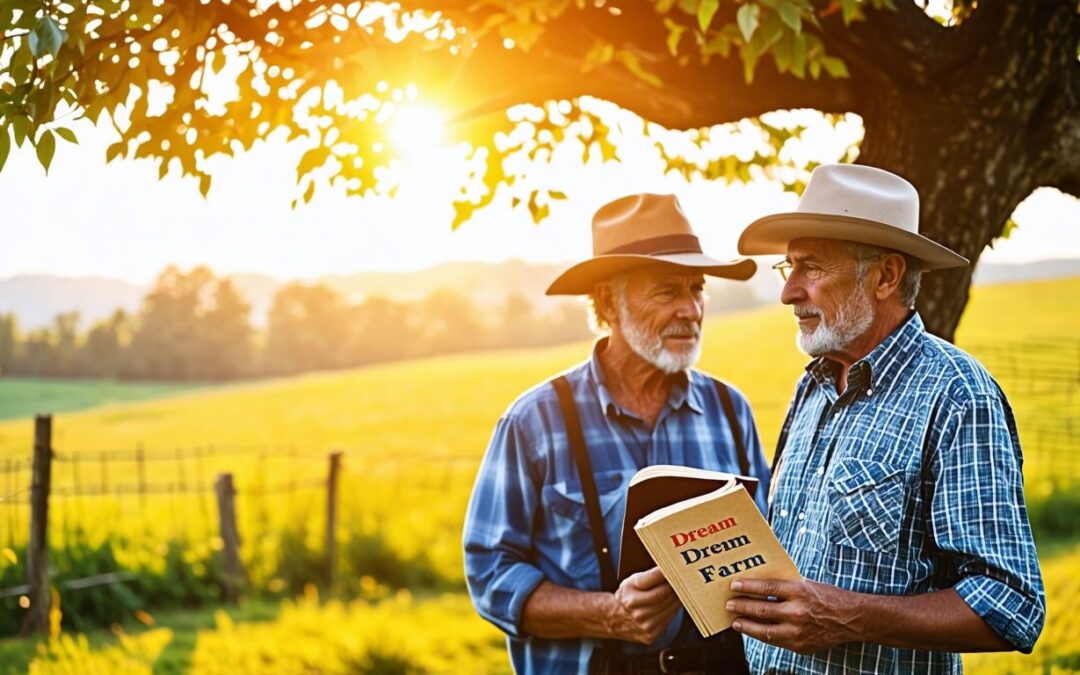Many of us dream of finding true friendship and achieving our goals. George and Lennie, two migrant workers in the novel “Of Mice and Men,” share a powerful dream that fuels their journey.
This blog post will explore their shared aspiration for independence through owning a farm, highlighting how this dream offers them hope, companionship, and an escape from loneliness and poverty.
Discover how their united dream symbolizes the American Dream itself.
Key Takeaways
- George and Lennie dream of owning a farm to escape their life of hardship. They believe having land will give them independence, joy in working for themselves, and freedom from poverty.
- Their shared dream strengthens their friendship and helps them fight loneliness. By dreaming of the future together, they find companionship and support in each other amidst the challenges of being migrant workers.
- The idea of tending to rabbits on the farm is particularly important to Lennie as it symbolizes responsibility and care. It brings him happiness and represents a significant part of their dream for a better life.
- Facing obstacles like poverty, discrimination, and unpredictable work conditions challenges George and Lennie’s hope. Yet, their determination keeps them striving towards achieving their vision despite these hardships.
- The notion of owning land connects directly with the American Dream for George and Lennie. It stands for success achieved through hard work, embodying hope even when faced with difficulties.
George and Lennie’s Dream
George and Lennie dream of owning their own farm. They want to escape the struggles of daily life and work for themselves, finding freedom in their shared vision.
Owning a farm
George and Lennie share a mutual goal of owning a small farm. This ambition offers them a chance to live off the land and be their own bosses. The dream includes simple elements like a mediocre house, a rabbit pen, and even a garden.
For Lennie, tending to the rabbits becomes an essential part of this collective dream. The idea of farming symbolizes freedom from their current struggles with discrimination and poverty.
Achieving this co-owned goal would mean escaping loneliness while creating a life filled with purpose and security.
Working for themselves
George and Lennie’s shared dream centers around the idea of working for themselves. They envision a small farm where they can live independently, away from the constraints set by others.
This coowned goal brings them a sense of security and freedom that their current lives lack. They see this ranch as a place where they won’t just be laborers but masters of their own destiny.
The dream includes tending to crops, raising animals, and most importantly, giving Lennie the opportunity to care for rabbits.
The aspiration to work independently highlights their joint ambition to escape poverty and discrimination. It serves as motivation during tough times on the road, fueling their desire for a better life.
By owning a piece of land, George and Lennie seek not only financial stability but also companionship in creating something meaningful together. Their coordinated longing reflects both hope for the future and an understanding that true fulfillment comes from being self-reliant.
Significance of the Dream
George and Lennie’s dream gives them hope for a better future. It brings them together, creating a strong bond against their loneliness.
Hope
Hope plays a crucial role in George and Lennie’s lives. Their shared dream of owning a small farm gives them something to aspire to amidst their struggles. This vision serves as a beacon of light, representing the possibility of independence and security.
It fuels their determination to work hard for a better future.
Both characters find solace in this common objective. They see the farm as an escape from loneliness and despair, symbolizing their desire for control over their own destiny. The thought of tending to rabbits on the farm fills Lennie with joy, while George envisions being his own boss.
Together, they cling to this collaborative aspiration, which strengthens their bond and provides hope in an uncertain world.
Sense of companionship
The dream George and Lennie share fosters a profound sense of companionship between them. They rely on each other for emotional support as they navigate the hardships of life as itinerant workers.
Their shared vision creates a bond that is rare in their challenging world, where loneliness often prevails. This connection helps to alleviate their feelings of isolation while giving them hope for a better future.
Through conversations about the farm, they strengthen their friendship and reinforce their commitment to achieving this dream together. Their desire for independence is intertwined with this relationship, making it all the more significant in shaping their journey towards self-sufficiency.
Escape from loneliness
George and Lennie’s dream serves as a powerful escape from loneliness. The bond they share allows them to find comfort in each other’s company amidst the harsh realities of their lives.
Achieving their vision of owning a farm means creating a home, where they can foster companionship and community away from the isolation felt by many itinerant workers. This shared goal provides them with motivation and hope, acting as an anchor against their overwhelming feelings of solitude.
For Lennie, tending to rabbits on the farm symbolizes not just responsibility but also connection—something he deeply craves. Having their own land represents freedom and security, allowing both characters to imagine a life devoid of loneliness.
Living off the land together encapsulates their desire for belonging and stability, making their dream essential to overcoming feelings of abandonment in an unforgiving world.
The American Dream in “Of Mice and Men”
The American Dream in “Of Mice and Men” shows the hope of a better life. It symbolizes George and Lennie’s longing for freedom and success despite their hardships.
Symbolism and representation
George and Lennie’s dream of owning a farm symbolizes hope and independence. This vision represents their desire for a better life, free from the hardships they face in their current situations.
The farm becomes a beacon of light for both characters, offering them security and freedom. For Lennie, tending to rabbits on this imaginary land reflects simple joys that keep him motivated.
Their shared goal embodies the essence of the American Dream—working hard to achieve success and controlling their own destinies. Ultimately, this dream serves as their source of motivation amidst overwhelming challenges.
The obstacles they encounter highlight their struggles against poverty and discrimination in pursuit of this dream.
Represents hope and determination
George and Lennie’s dream of owning a farm embodies hope and determination. This vision provides them with motivation in their harsh lives. The desire to work for themselves reflects their longing for independence and control over their futures.
It symbolizes security, where they can escape loneliness and poverty. Tending to the rabbits represents not just Lennie’s simple pleasures but also the innocence tied to their aspirations.
Their shared dream serves as an anchor, helping them cope with daily struggles as they strive for a better life together. Despite many obstacles, this dream fuels their commitment to each other and inspires perseverance on their journey.
The American Dream in “Of Mice and Men” intertwines closely with George and Lennie’s shared vision, illustrating its deeper significance in the story’s context.
Obstacles and Disappointments
George and Lennie face many challenges on their journey. Their dreams clash with harsh realities, making hope seem distant at times.
Poverty and discrimination
Poverty and discrimination pose significant obstacles to George and Lennie’s dream. As itinerant workers during the Great Depression, they face economic hardship daily. Their desire for a small farm symbolizes their aspiration to escape this life of instability.
The lack of resources makes it difficult for them to save money and attain their goal. Discrimination affects their job opportunities as well, adding more barriers in achieving their vision.
The companions’ vision of owning land represents hope amid despair. Yet societal prejudice toward those like them complicates matters further. This dream highlights not just personal ambitions but reflects broader struggles against poverty and inequality faced by many during that era.
Disappointment lurks around every corner as they strive for something better while battling these harsh realities.
Challenges they face in achieving their dream
George and Lennie face numerous challenges in achieving their dream of owning a farm. Their lives are marked by poverty and discrimination, which constantly threaten their aspirations.
Financial instability looms large over them, making it difficult to save money for the land they desire. The harsh realities of being itinerant workers limit their opportunities for stability or advancement.
Additionally, societal prejudices hinder their chances of realizing this shared dream. As part of a marginalized group during the Great Depression, they struggle against an unforgiving system that often leaves them feeling powerless.
The difficulties encountered intensify when external factors come into play. They experience constant interruptions from the unpredictability of work conditions and personal conflicts with others on the ranch.
These obstacles challenge not only their resolve but also deepen feelings of isolation as they navigate daily life while dreaming about escaping to a better future on their own little farm.
Conclusion
George and Lennie’s dream of owning a farm represents their hopes for a better life. This vision fuels their determination to escape the isolation they face. The dream symbolizes freedom, security, and companionship.
It shows how deeply they long for control over their own future. Despite the obstacles in their way, this shared aspiration keeps them motivated and united.
FAQs
1. What is the dream that George and Lennie share?
George and Lennie share a dream of owning their own piece of land, where they can live freely without being under anyone’s control.
2. How does this shared dream influence George and Lennie’s actions?
Their shared dream motivates them to work hard, save money, and stick together despite the challenges they face.
3. Is there a motif in what George and Lennie aspire for?
Yes, their shared vision serves as a recurring motif throughout their journey symbolizing hope for freedom from societal norms.
4. Can you explain how this dream shapes the bond between George and Lennie?
The shared aspiration strengthens their bond as it gives both characters common ground to strive towards; shaping not only their relationship but also guiding them through life struggles.





